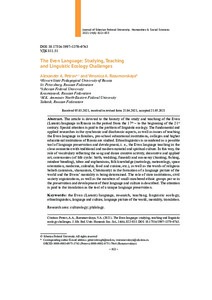The Even Language: Studying, Teaching and Linguistic Ecology Challenges
Скачать файл:
URI (для ссылок/цитирований):
https://elib.sfu-kras.ru/handle/2311/141350Автор:
Petrov, Alexander A.
Razumovskaya, Veronica A.
Петров, А. А.
Разумовская, В. А.
Дата:
2021-06Журнал:
Журнал Сибирского федерального университета. Гуманитарные науки. Journal of Siberian Federal University. Humanities & Social Sciences; 2021 14 (6)Аннотация:
The article is devoted to the history of the study and teaching of the Even (Lamut) language in Russia in the period from the 17th – to the beginning of the 21st century. Special attention is paid to the problem of linguistic ecology. The fundamental and applied researches in the synchronic and diachronic aspects, as well as issues of teaching the Even language in families, pre-school educational institutions, colleges and higher educational institutions of Russia are studied. Ethnolinguistics is considered as a possible tool of language preservation and development, i. e., the Even language teaching in the close connection with traditional and modern material and spiritual culture. In this way, the role of vocabulary reflecting the song and dance creative activity, decorative and applied art, ceremonies (of life cycle: birth, wedding, funeral) and economy (hunting, fishing, reindeer breeding), taboo and euphemisms, folk knowledge (metrology, meteorology, space orientation, medicine, calendar, food and cuisine, etc.), as well as the words of religious beliefs (animism, shamanism, Christianity) in the formation of a language picture of the world and the Evens’ mentality is being determined. The role of state institutions, civil society organizations, as well as the members of small-numbered ethnic groups per se in the preservation and development of their language and culture is described. The attention is paid to the translation as the tool of a unique language preservation Статья посвящена истории изучения и преподавания эвенского
(ламутского) языка в России в период с XVII– по начало XXI века. Отдельное
внимание уделено проблеме лингвоэкологии языка. Рассматриваются фундаментальные
и прикладные исследования в синхронном и диахроническом аспектах, а также
вопросы преподавания эвенского языка в семье, дошкольных образовательных
учреждениях, колледжах и высших учебных заведениях России. Изучаются
возможности этнолингвистики для сохранения и развития языка: преподавание
эвенского языка в тесной связи с традиционной и современной материальной
и духовной культурой. Для этого устанавливается роль лексики, связанной с песенно-танцевальным
творчеством, с декоративно-прикладным
искусством, обрядовой
лексики жизненного цикла (рождение, свадьба, похороны), производственной
(охотничьи, рыболовецкие, оленеводческие обряды) лексики; табу и эвфемизмов;
лексики, связанной с народными знаниями (метрология, метеорология, ориентация
в пространстве, медицина, календарь, питание и кухня и др.), а также слов, отражающих
религиозные воззрения (анимизм, шаманизм, христианство) в формировании языковой
картины мира и менталитета эвенов. Отмечена роль государственных институтов,
общественных организаций, а также самих представителей малочисленного этноса
в сохранении и развитии своих языка и культуры. Обращено внимание на перевод
как инструмент сохранения уникального языка
Коллекции:
Метаданные:
Показать полную информациюСвязанные материалы
Показаны похожие ресурсы по названию, автору или тематике.
-
Ethnolinguistic Ecology of the Peoples of the North, Siberia and the Far East (On the Material of the Languages of the Northern Group of the Manchu-Tungus Languages)
Petrov, Alexander A.; Razumovskaya, Veronica A.; Петров, А. А.; Разумовская, В. А. (Сибирский федеральный университет. Siberian Federal University, 2019-08)The article is devoted to the problem of ethnolinguistic ecology of the indigenous peoples of the North, Siberia and the Far East — speakers of the northern group of the Manchu-Tungus languages of the Altai linguistic ... -
Ethnolinguistic Ecology of the Peoples of the North, Siberia and the Far East (On the Material of the Languages of the Northern Group of the Manchu-Tungus Languages)
Petrov, A. A.; Razumovskaya, V. A. (2019-08)The article is devoted to the problem of ethnolinguistic ecology of the indigenous peoples of the North, Siberia and the Far East — speakers of the northern group of the Manchu-Tungus languages of the Altai linguistic ... -
The Factors of British and American English Development under Globalisation
Melnichenko, Konstantin A.; Мельниченко, К.А. (Сибирский федеральный университет. Siberian Federal University., 2014-06)The paper studies the processes which arise during language contacts between the most influential varieties of the English language, British English and American English (BE and AE), and various autochthonous languages ... -
Этноязыковая ситуация Красноярского края в начале третьего тысячелетия
Фельде, О.В.; Felde, Olga V. (Сибирский федеральный университет. Siberian Federal University., 2011-07)This article presents the up-to-date view of ethno-linguistic situation in polylanguage and polycultural the Krasnoyarsk Territory. The functional typology of languages of this Siberian region has been given; historical ... -
Problems of Preserving the Kazakh Language in China: Threats of Extinction and Ways of Solution
Zharkynbekova, Sholpan K.; Tazhibayeva, Saule Zh.; Filchenko, Аndrey U.; Жаркынбекова, Ш. К.; Тажибаевa, С. Ж.; Фильченко, А. Ю. (Journal of Siberian Federal University. Сибирский федеральный университет, 2025-03)This article examines the Kazakh language spoken in China, focusing on its unique characteristics, historical development, and challenges in the context of globalization and sociolinguistic transformations. The study ...

